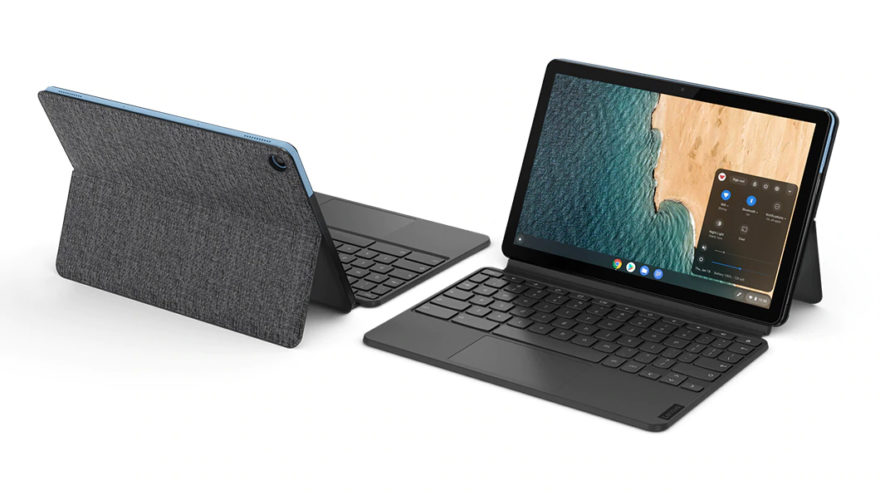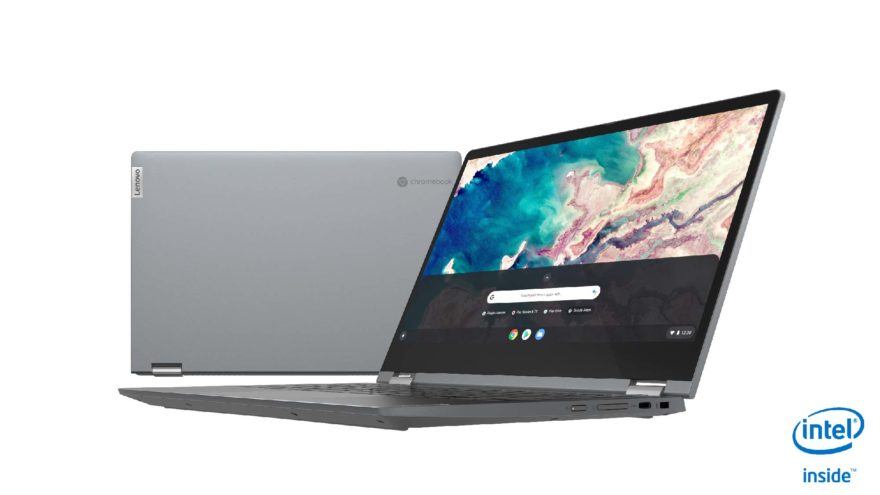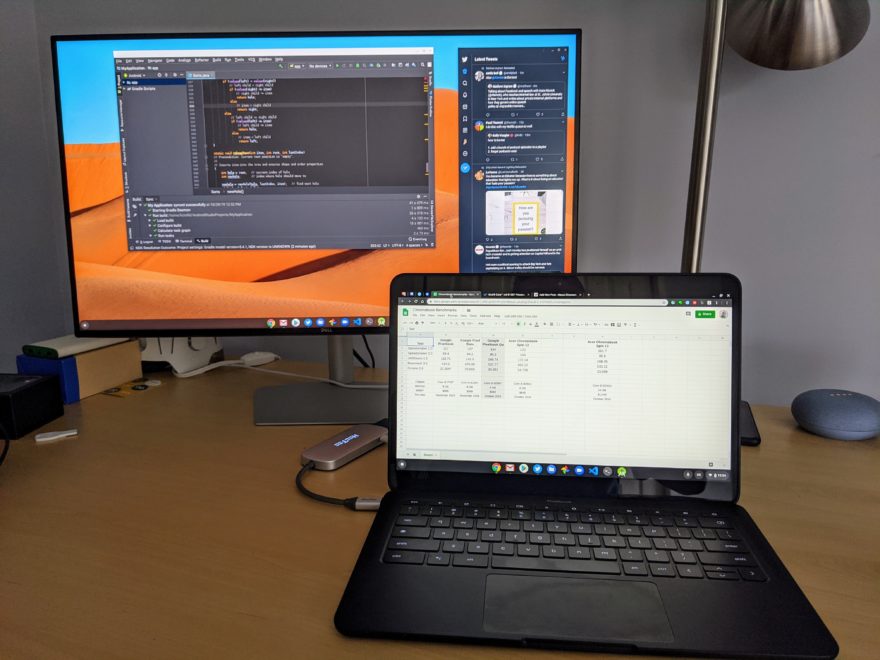Although most things pretty much sucked in 2020, I have to say it was a good year for Chromebooks and Chrome OS users. I know, in the grand scheme of things, that’s not much, but I’m trying to find the silver lining.
We’ve seen a huge boost in demand for Chromebooks, which is both good and bad: Good because it keeps hardware makers interested in creating new devices and bad because of inventory shortfalls when schools needed hardware the most. This year also debuted the first Project Athena Chromebooks. I’m not truly enamored by most of them, mainly from a price to value perspective, but it’s a good development overall.

2020 also gave rise to an unexpected, low-cost delight in the Lenovo Duet Chromebook tablet.
For under $300, it’s a great little portable package that I recommend mainly as a secondary device. You can connect it to an external monitor for primary work but depending on that work, the MediaTek chip and 4 GB of memory might be a big ask. Still, it’s a highlight for the year in my book.
Even in the mid-range market, this year saw hardware specs rise up while prices were mainly flat or even down. The Lenovo Flex 5 at $409 (or less when on sale) is a perfect example. Yes, you’re limited by the 4 GB of memory but you’re getting a 10th-generation Intel Core processor, convertible form factor, and solid 1080p touchscreen for the price.

These and other related hardware developments since January are going to make my “Chromebook of the year” pick rather difficult this year. Or at least more difficult than last year. I’ll be making that pick and sharing it between Christmas and the New Year’s Day that we all can’t wait for. Won’t it be nice to put an end to 2020?
Having said that, I know that many “under the radar” Chromebooks are often fan favorites.
For example, Matthew tweeted out to me that I shouldn’t be overlooking the $170 Lenovo Chromebook 3:
this might also be Chromebook of the Year?
— matthew (@mathewinvisitec) December 8, 2020
The Lenovo Chromebook 3 is awesome!
As an experiment
I went to Walmart and got a $170 Chromebook.
Considering the price and everything you get for it,
this is a definite winner in my book!
Nov 12, 2020https://t.co/aUlMfKD7kX
Others have told me that even with the mediocre battery life, they’re big fans of the fanless Samsung Galaxy Chromebook. (See what I did there?) And still, others think that the HP Chromebook 14c, with options ranging from a Pentium to various 10th-gen Intel Core processors, offers customized buying options for a “just the right size” Chromebook. The choices go on and on.
So I’m asking you: What would be your pick for Chromebook of the year and why?
My criteria could be different from yours, and that’s perfectly fine. There is no one size fits all Chromebook because we all have different requirement priorities and use our devices in different ways. I doubt many are using a Chromebook to complete a Computer Science college program like I do, for example.
Oh, and for anyone who bought the Google Pixelbook Go, that was my pick for last year. Whether you knew that or not, I’d be very curious as to how you feel about that purchase.



17 Comments
My Dell Windows 10 Laptop with Neverware’s CloudReady installed 🙂
Hey, that’s cheating! 😉
The Duet. Affordable. Good screen. Good format. Good tablet. Good portable Chromebook.
If you want premium, I really like the Asus Chromebook Flip 436FA. The i3 feels every bit as fast as the i5 Acer Chromebook Spin 13, and it’s display somehow feels slightly larger. The 128GB PCIe SSD may help give it that extra bit of performance. The fingerprint sensor, back-lit keys, large glass touchpad, and USI stylus are all really nice to use everyday. The separation of the quad speakers sounds great. I often work an eight-hour day with it running only on battery. It’s also very pleasing to the eyes, with the lid open or closed.
Daily driver is the C434, and I can’t find anything spec wise I would replace it with. My only CB purchase this year was a Lenovo Duet, and I love it. Comes out on site with me for client visits. Light, very portable and packs some punch for its size.
My pick would be the Lenovo Duet Chromebook. The battery life on it is amazing, and the screen is really nice. Best Buy has it on sale today for $229, which is an amazing deal. I also bought one for my son a few weeks ago for the same price. My only complaints are the cramped keyboard (but at least it comes with one at no extra cost) and the lack of a microSD card slot.
My daily Chromebook driver is a Lenovo IdeaPad Flex 5 with core i5 processor, 8 GB RAM and 128GB NVMe PCI3.0 x4 SSD. In the UK it cost £529 direct from Lenovo. It has a good 13-inch display, keyboard, trackpad, and battery life. It supports and works well with a USI pen and the audio is fine for this class of device. But what makes it a great Chromebook for me is its performance Vs cost. Its over £100 cheaper than the equivalent spec Acer Spin 713 Chromebook. Running Linux apps on it is a breeze. It will run Android Studio along with an Android device emulator, and you can install Steam for light / retro gaming.
My new Acer Chromebook 715 with its full size keyboard, including a number pad and touch screen is my ideal computer. Those familiar with Chromebook already know the amazing capability compared with Windows 10 computers.
During Black Friday sales I was able to buy for less than $300 including shipping and 7% sales tax.
I would pick the Pixelbook Go for the same reasons you did last year…
Acer Chromebook Spin 713 for me. Got on a sweet deal from Best Buy ($530) with a pair of true wireless Jabra thrown in for $20. The 10th gen core i5 and 8GB of RAM never let me down. My singular complaint is the speakers could be louder.
IMO, the Acer R11 CB5-132T was and is superior to most of the new, more expensive Chromebooks.
It has a good IPS touchscreen, keyboard, trackpad, sound, camera and battery life, an Intel processor, 4 GB RAM, 32 GB storage, and a rugged build that is geared to use, not transport or admiration. It’s rugged enough for an 8 year old kid to use, sturdy enough to be used ON A LAPTOP by an adult sitting on a rocking chair.
My machine sees more software churn than most, as I look for apps for other users who need to get work done using a computer. I’ve beaten on it +10 hours a day for almost 4 years, and have yet to find a Chrome or Android business app (at least those that can run on a Chromebook) or Linux program that doesn’t run on it well enough to slow the productivity of an experienced, competent computer user. I had to Powerwash it only once to prove that a new issue was caused by a Google update, not an app or extension.
They only time it’s been unable to do what it was designed to do was when Google botched its pwn update code to disable auto-rotation with a Bluetooth peripheral attached. It took Google 9 months to fix its defective code.
Unfortunately, Google now seems to intend forcing this machine into obsolescence, withholding new features, by making “guaranteed” updates for it lowest priority, along with 6 other platforms that are “supported” until the end of 2022.
https://www.ifixit.com/News/30282/how-to-get-updates-on-your-end-of-life-chromebook
James:
You misunderstood.
My machine won’t reach end of support until 12/21/2022, and what you refer to are only security patches and Cloudready. Cloudready is Chromium OS and doesn’t support either Android or Linux.
It does support Linux.
Still using the Asus C434T
You’re right. My concept of OS support is different than yours.
Mine covers maintaining operation of the OS and its standard features in a way that doesn’t violate any of the basic principles of the design. Chrome OS has Linux and Android integrated as sequestered secure subsystems, that are installed through the OS and can’t compromise the integrity of the Chrome OS. I also include not just whether you can do something with the OS to include whether the maker of the platform will provide tech support for that ability.
I chose to try Chrome OS as an alternative to Windows for the people I support because its basic security and integrity as it freed me from onerous monthly support chores. The tech support available with any Google One subscription was the cincher for the are cases that require tech backup for quickly determining whether a problem is an OS bug or a user instance. (Google’s unpaid user staffed “support” forum are basically for novice users and commiseration).
Cloudready Home Edition has an installer that can be run from Linux, and it contains experimental support for running native Linux applications packaged as Flatpaks. That would be enough for a developer or advanced computer user with some Linux experience who is not concerned about system security or integrity. https://cloudreadykb.neverware.com/s/article/Experimental-Flatpak-Application-Support-64bit-Home-Edition
For those who are familiar with Linux this may be a better way of gaining access to Linux apps than the multi-step installation of the framework in ChromeOS, but it isn’t an obvious one.
I’d be willing to use it to gain access to Linux programs, but I wouldn’t recommend it to a person who uses Linux only because it has one or two programs that have no Chrome equivalents for one reason. “Neverware does not offer any technical support for the Home Edition”.
The Pixelbook Go is the best Chromebook on the market at the moment: best design, keyboard, best webcam. Nothing compares at the moment.